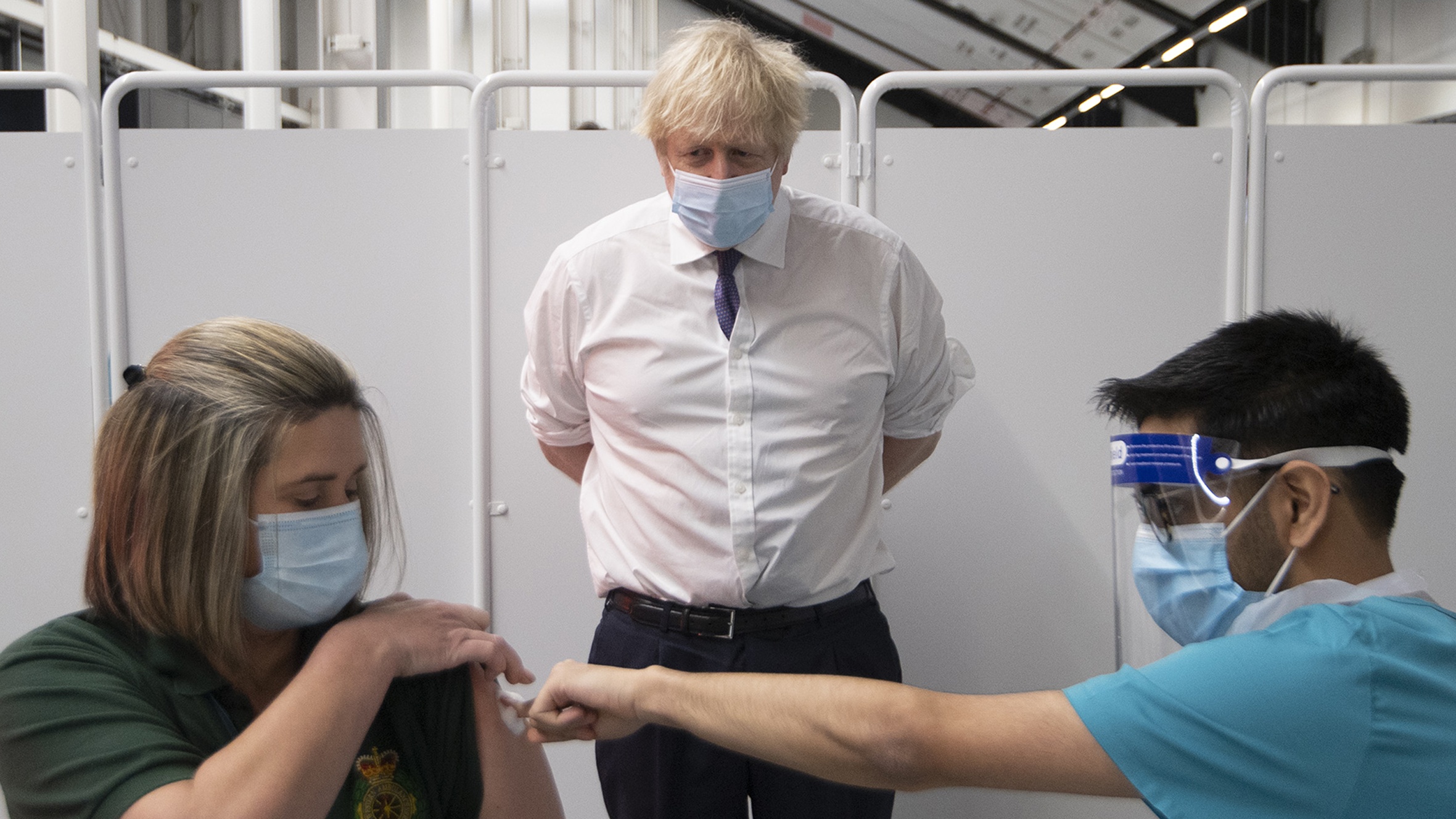What does Oxford vaccine efficacy mean for getting back to normal life?
New data shows jab may cut transmission by 67% - raising hopes of end to lockdowns

A free daily email with the biggest news stories of the day – and the best features from TheWeek.com
You are now subscribed
Your newsletter sign-up was successful
A single dose of the Oxford-AstraZeneca vaccine may have a “substantial effect” on curbing the spread of Covid-19 and provide sustained protection against the virus for at least three months, a new study has found.
Test results from the University of Oxford published in a pre-print report in The Lancet show that the first shot may reduce transmission among people who have had the jab by 67% while providing an average of 76% protection against symptomatic infections from three weeks until 90 days.
In a finding that appears to support the UK’s decision to delay second doses, the research also indicates “that spacing out the second dose by a longer period in fact further increases its efficacy”, reports Politico’s London Playbook.
The Week
Escape your echo chamber. Get the facts behind the news, plus analysis from multiple perspectives.

Sign up for The Week's Free Newsletters
From our morning news briefing to a weekly Good News Newsletter, get the best of The Week delivered directly to your inbox.
From our morning news briefing to a weekly Good News Newsletter, get the best of The Week delivered directly to your inbox.
Health Secretary Matt Hancock welcomed the news as “absolutely superb”, adding that the early results show that “vaccines are the way out of this pandemic”.
That verdict was echoed by Professor Robert Read, a member of the Joint Committee on Vaccination and Immunisation. As LBC’s Tom Swarbrick tweets, Read is predicting that “if the numbers are right, and we’ve vaccinated 50-year-olds, the government will be in a position to look at a smooth transition to end lockdown”.
The publication of the data has renewed calls for Boris Johnson to reopen schools at the earliest possible opportunity, with senior Tory MPs telling The Telegraph that the prime minister is facing “relentless pressure” from across the party.
Tory MP William Wragg, chair of Parliament’s public administration committee, said yesterday that with schools in Scotland set to reopen within weeks, “I’m wondering what’s holding us back from opening them up in England too”.
A free daily email with the biggest news stories of the day – and the best features from TheWeek.com
While the vaccine data suggests that the UK’s jab campaign is on the right track, however, the discovery of the first domestic Covid mutation has cast a shadow over the celebrations.
Hancock told the Commons yesterday that coronavirus “mutations of concern” have been found in Bristol and Liverpool. Christina Gray, director of public health for Bristol, added that “early detection of this mutated form of the virus that first appeared in Kent means we can respond swiftly to ramp up testing in the area to better understand the local situation”.
The emergence of more new strains of the coronavirus is “not a surprise”, says The Times’ science editor Tom Whipple, and “tweaked versions of the vaccine in development”.
“The good news is once we all begin to receive those, we will probably be just as safe from the variants as with the bog-standard original version,” he continues. “The bad news is that that will give evolution a niche to try something new.”
Government officials have also moved to temper expectations of a swift end to the current lockdown. Sources told Politico’s London Playbook that with the number of Covid cases per 1,000 people in England currently at 294, compared with 144 in Scotland, Downing Street will continue to take a “cautious” approach.
Chas Newkey-Burden has been part of The Week Digital team for more than a decade and a journalist for 25 years, starting out on the irreverent football weekly 90 Minutes, before moving to lifestyle magazines Loaded and Attitude. He was a columnist for The Big Issue and landed a world exclusive with David Beckham that became the weekly magazine’s bestselling issue. He now writes regularly for The Guardian, The Telegraph, The Independent, Metro, FourFourTwo and the i new site. He is also the author of a number of non-fiction books.
-
 The ‘ravenous’ demand for Cornish minerals
The ‘ravenous’ demand for Cornish mineralsUnder the Radar Growing need for critical minerals to power tech has intensified ‘appetite’ for lithium, which could be a ‘huge boon’ for local economy
-
 Why are election experts taking Trump’s midterm threats seriously?
Why are election experts taking Trump’s midterm threats seriously?IN THE SPOTLIGHT As the president muses about polling place deployments and a centralized electoral system aimed at one-party control, lawmakers are taking this administration at its word
-
 ‘Restaurateurs have become millionaires’
‘Restaurateurs have become millionaires’Instant Opinion Opinion, comment and editorials of the day
-
 A Nipah virus outbreak in India has brought back Covid-era surveillance
A Nipah virus outbreak in India has brought back Covid-era surveillanceUnder the radar The disease can spread through animals and humans
-
 Is the US about to lose its measles elimination status?
Is the US about to lose its measles elimination status?Today's Big Question Cases are skyrocketing
-
 Covid-19 mRNA vaccines could help fight cancer
Covid-19 mRNA vaccines could help fight cancerUnder the radar They boost the immune system
-
 Is this the end of ultraprocessed foods?
Is this the end of ultraprocessed foods?Today's Big Question California law and the MAHA movement are on the same track
-
 Can TrumpRx really lower drug prices?
Can TrumpRx really lower drug prices?Today’s Big Question Pfizer’s deal with Trump sent drugmaker stocks higher
-
 The new Stratus Covid strain – and why it’s on the rise
The new Stratus Covid strain – and why it’s on the riseThe Explainer ‘No evidence’ new variant is more dangerous or that vaccines won’t work against it, say UK health experts
-
 RFK Jr. vaccine panel advises restricting MMRV shot
RFK Jr. vaccine panel advises restricting MMRV shotSpeed Read The committee voted to restrict access to a childhood vaccine against chickenpox
-
 RFK Jr. scraps Covid shots for pregnant women, kids
RFK Jr. scraps Covid shots for pregnant women, kidsSpeed Read The Health Secretary announced a policy change without informing CDC officials